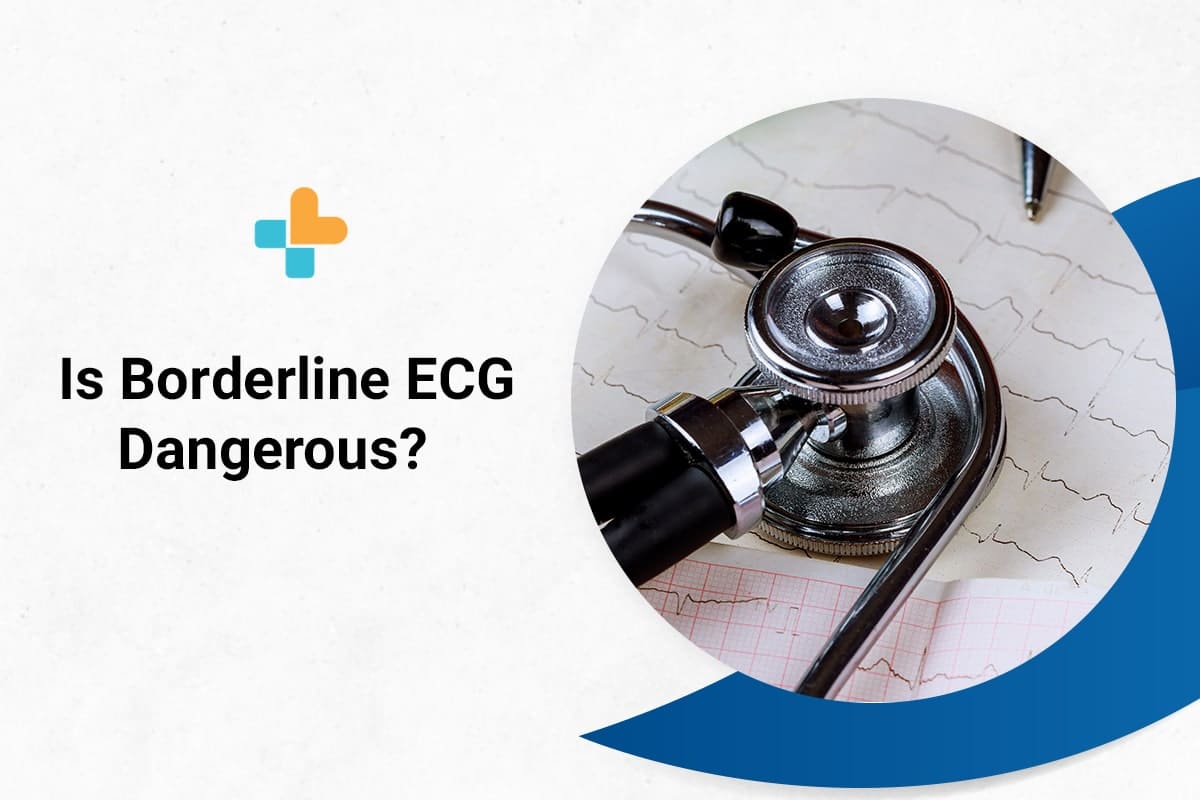Electrocardiogram, also known as an ECG or an EKG is a diagnostic tool that is often recommended to people who have a known or suspected heart issue. They are also often performed by clinicians as a part of a routine yearly examination.
If you’ve recently had this test and have heard the term “borderline ECG” thrown around and are unsure what it means, we’re here to assist. In this blog, we’ll discuss what it means to have borderline ECG with chest pain, as well as what it means to have an unconfirmed borderline ECG, among other things.
But first, let’s define ECG and the purposes for which it is employed.

Electrocardiogram (ECG/EKG)
The electrical signals in the heart are monitored and recorded by an electrocardiogram. It’s a simple, non-invasive test for detecting heart issues and monitoring heart health.
Electrocardiograms are used by doctors to diagnose a variety of cardiac problems. This test is performed on patients who present symptoms such as chest pain, heaviness in the chest, dizziness, or shortness of breath. It is also frequently used as the first indicator of a cardiac condition.

An abnormal ECG might indicate a variety of conditions. An ECG abnormality can also be a normal variation of the heart’s rhythm that has no effect on your health and is no cause for concern.
Here are some of the aspects an ECG can help your doctor determine.
- Detects unusually, fast, slow or irregular heartbeats
- Determines if you are having a heart attack or had a heart attack previously
- Lack of blood flow
- Blocked arteries
- Problem with heart valves
What is Borderline ECG?
A borderline ECG is the term used when there is an element of irregularity in the ECG result.
ECG data are read by doctors using a series of spikes and drops traced on paper. These tracings are recordings of the rhythm of the heart. They show how a patient’s heart is beating in real-time. Any results that do not fall within a reasonable range are classified as abnormal or borderline.
When an ECG is borderline, it signifies that there are some anomalies present, and the doctor will need to analyse the patient with further tests to see if they are significant.
The following are the terms you might see on your ECG report.
Borderline ECG Normal Sinus Rhythm
A normal sinus rhythm suggests a healthy heartbeat. It means your sinus node’s electrical pulse is being properly distributed throughout your heart muscle. A borderline ECG normal sinus rhythm could mean that the results are within normal ranges but on the verge of being abnormal.
Borderline ECG Unconfirmed
In the inpatient setting, there are two categories of diagnoses: confirmed diagnoses and unconfirmed diagnoses. For inpatient stays, unconfirmed diagnoses are indicated using phrases like “likely,” “possible,” “suspected,” or “yet to be ruled out” or other similar terminology. As a result, a borderline ECG that is unconfirmed means that there are indicators of an irregular rhythm, but it is not verified and may require additional tests or a retest.
What Causes Borderline ECG?
Patients should not be alarmed if their ECG is borderline, as there are a variety of causes for this, and is not always harmful. Some of the reasons are as follows.
- Patients who seem worried or anxious before the reading show borderline ECG
- Improper procedure and/or faulty machines could show borderline readings
- Patients with large breasts or extensive fat deposits in their chests are more likely to have a borderline ECG as it might be difficult to accurately place sensors.
- Small differences in cardiac rhythm and function can also show borderline ECG readings
If a patient’s ECG is borderline, the doctor may suggest testing again in the future to keep an eye on the situation. Otherwise, the doctor may merely make a note of the observation in the patient’s chart for future reference.
Frequently asked questions
– What is a good ECG reading?
The ECG’s normal range is different for men and women. The abnormal results of one patient could be the normal heart function of another. Hence, it’s best to talk to your doctor about what your baseline range should be.
– Why would an ECG be abnormal?
A normal human cardiac rhythm is between 60 to 100 beats per minute. The ECG is generally regarded as abnormal if the patient has bradycardia (slow beat activity) of less than 60 or tachycardia (rapid beat activity) of more than 100 unless the doctor has specific reasons to believe the results are defective or incorrect.
– Can anxiety cause borderline ECG?
Many patients get anxious before getting an ECG, which can cause little differences in their heart rhythms to show up on the test. If the patient seems particularly concerned, the doctor may disregard the results and order a fresh test to see if more accurate results can be obtained.
– Can you still have heart problems if your ECG is normal?
Yes, even if your ECG shows up normal, you could have a heart attack. This is because ECGs cannot detect an asymptomatic obstruction in your arteries that could put you at risk of a future heart attack. Hence, it’s recommended to confirm heart conditions with a combination of other tests and not an ECG alone.
– How is abnormal ECG treated?
An abnormal ECG can be caused due to numerous factors. Hence, the treatment for an abnormal ECG depends on the underlying cause.
If you need a second opinion on your ECG readings or would like to consult the best cardiologists in Banglore about your symptoms or conditions, reach out toAyu Health. Call us at +91 – 6366 100 800 for a consultation or book an appointment online.
Our Hospital Locations
Cardiac Surgery Hospitals in Chandigarh | Cardiac Surgery Hospitals in Bangalore | Cardiac Surgery Hospitals in Jaipur | Cardiac Surgery Hospitals in NCR | Cardiac Surgery Hospitals in Hyderabad
Our Doctors
Cardiac Surgery Doctors in Chandigarh | Cardiac Surgery Doctors in Bangalore | Cardiac Surgery Doctors in Jaipur | Cardiac Surgery Doctors in NCR | Cardiac Surgery Doctors in Hyderabad
About the Author

Dr. Darshan Krishnappa
Dr. Darshan Krishnappa is a renowned cardiologist currently practicing at Ayu Health, Bangalore.
Dr. Darshan Krishnappa is a Cardiologist with 7 years of experience. He completed his MD in Internal Medicine from the prestigious All India Institute of Medical Sciences, New Delhi. He is specialized in cardiology.




